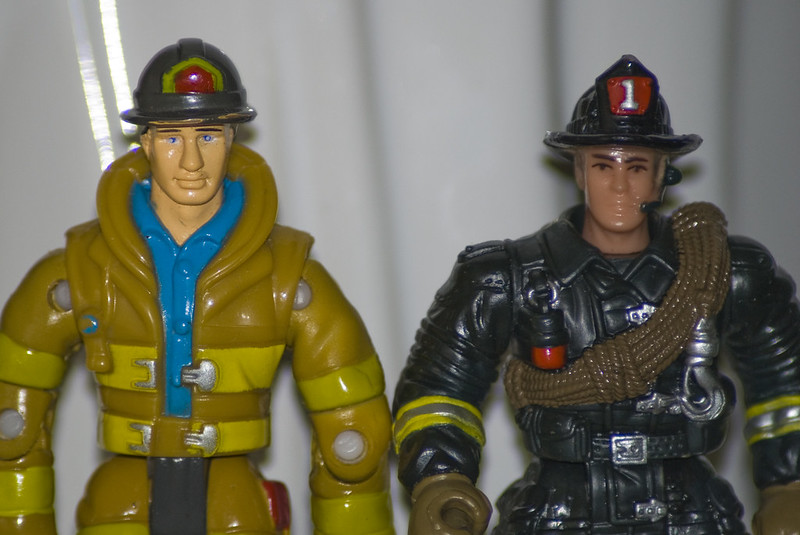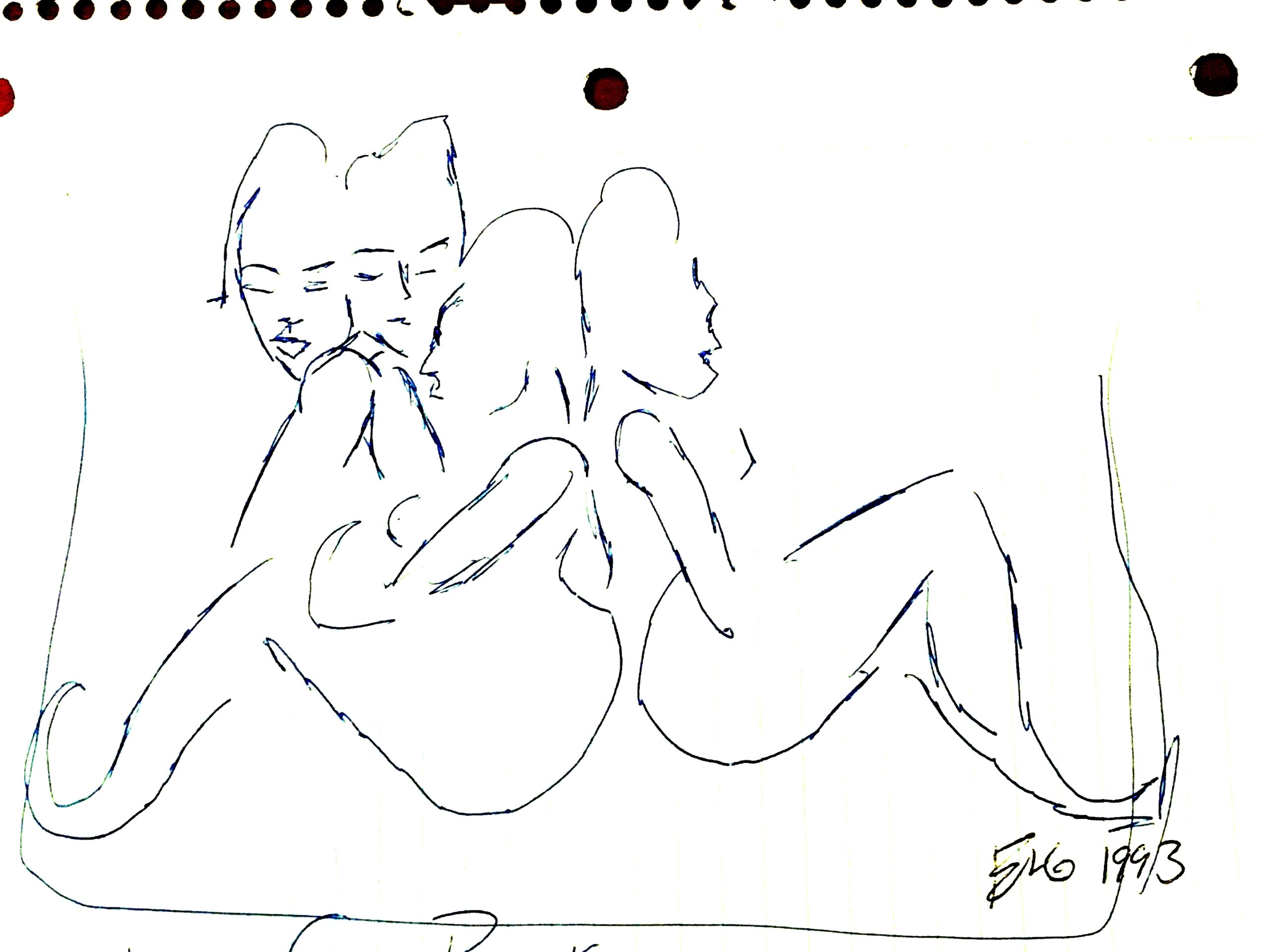I’m a twin. Like Remus and Romulus; Artemis and Apollo; Viola and Sebastian in Shakespeare’s Twelfth Night; or Tweedledee and Tweedledum, if you like, in Alice’s Adventures in Wonderland.
I’m one of those two or three percent of humans on planet Earth who has been born with their own doppelgänger. Who – if they’re an even rarer identical twin – has a genetic clone and shares 100 percent of their DNA with another person and never has to worry about finding a blood or bone-marrow match. And although we successfully divide in utero to emerge as two separate bodies and avoid the cruel fusion of Siamese twindom, we incubate from the same cellular blob as the other, nestled together nine months long in the most intimate of spaces. We walk this mortal coil[i] paired with a permanent life partner with whom we will always have more in common than with anyone else. No parent, no spouse, no non-twin sibling, no offspring, no other blood or social connection is as inextricably entwined as the double-helix twin bond.
Wonder Twins Power – Activate!
When people find out I have a twin – an identical twin sister, to boot! – it’s always the same questions: “Do you two really look exactly alike?”; “Can people tell you apart?”; “Do you dress the same?”; and “Can you two tell what the other is feeling or thinking?”
I used to laugh at that last one. Like most twins, my sister and I have shared our own unique “twin language” since infancy. But twin telepathy? I didn’t believe in that until a Sunday afternoon back in the 1990s proved that the twin phenomenon isn’t some woo-woo, “pseudomentary”-type sensationalism. That afternoon, the Universe sent us irrefutable proof that the double-helix entwinement of twins extends far past the physical.
It was one of those numbingly cold, soul-crushingly dank and overcast Midwest winter days in late February in the southeastern corner of Iowa. I was in college and had stitched together a variegated quilt of minimum-wage, part-time jobs that added up to more than full-time work, paying just enough to keep the rent and tuition paid. That Sunday afternoon, I was running the midday shift at the campus NPR-affiliate stations and hopping between public-radio talk shows, news on the AM station, and classical music on the FM side. I was prepping for the next live, on-air, half-hour break when the radio station suddenly smelled like a gas station, like some slob at the next pump who didn’t have to worry about counting his pennies had let the pump overrun and spilled unleaded onto the pavement.
I love the smell of gasoline. It’s the promise of road trips and freedom to this very day for me. E-car acolytes can keep their exploding batteries and woefully inadequate mileage ranges that are no match for a country as big and mostly still empty as ours. But all by myself in that tiny radio studio, located in the empty and inexplicably eerie university engineering building on that Sunday afternoon? There was no reason for me to be smelling gas. I opened the windows in the hallway to air things out. It only got stronger. I considered calling my boss – who was most likely listening to the station on his day off anyway, because he always listened to the station. But I knew he would insist on driving in to check things himself before he would encourage me to call 911. By that point, I didn’t think I would have the luxury of time before the whole building blew. So I called my Mom, who was living two states away. We normally talked on Sunday evenings, so she sounded surprised when I called earlier than usual. I told her about the gas-leak smell.
“It just keeps getting stronger, Mom. I should report it, right?” I asked.
“Don’t mess with gas leaks, Erica. Hang up and call 9-1-1 right now!” she ordered. My mom has always been tough as hell and expected her daughters to be that way, too. So for her to say don’t rely on myself and reach out for help instead, I knew I was in over my head.
I promised I’d call her back later if I survived the ensuing explosion.
Swarm! Swarm!
Not even five minutes after I made the “gas-odor call,” the first round of firefighters showed up at the studio. It was a small university town, but the fire response was disproportionately huge. The men – and they were all men back then – arrived in full gear. Looking out the window, I saw the first fire truck joined in quick succession by a second. Then a third, fourth, and fifth rig – all with their lights and sirens at full tilt, startling the handful of “civilians” brave enough to venture out into the cold that winter afternoon.
In total, about 20 firefighters swarmed the studio: serious, safety-minded, manly men responding to an emergency to keep me safe. One team broke off to survey the rest of the empty building to evacuate any diligent engineers who might be working on a Sunday. Another team brought in some gizmo to test the air quality for – I dunno – gas vs. oxygen, right? CO2 vs. oxygen? Unleaded vs. diesel?
Nothing. The monitor on the device didn’t beep or buzz or whatever it was supposed to do. They tried again. Then again.
Standing in the spot where the gas smell was strongest, they asked me, “This is exactly where you smelled the gas, right?”
“Yes,” I said, “and I can still smell it,” My countenance remained calm, but my ensuing staccato plea – “DON’T-YOU-SMELL-IT-TOOOOOOO?!” – belied my unruffled exterior. Though they were talking to me without a hint of mocking or doubt, I was starting to get really embarrassed – like maybe they thought I was on drugs or had been farting up the studio alone and freaking myself out.
A new fireman arrived on the scene with an armful of blueprint rolls and spread them out across the interview studio’s spacious floor. He and the fire chief studied them for about a minute, and then the fire chief said, “Huh. Now that’s the darndest thing…” Tracing the blueprint with his index finger, he added, “There aren’t any gas lines running through this block, or even into this building.” He took a closer look, tracing a few other lines with his finger. “This building is powered exclusively through electrical lines and partially through the city’s steam-tunnel system running up from the river power plant.
“Ma’am,” he said. Sounding more like a southerner than a midwestern fire chief as he addressed me in front of his team. “We’ve checked everything. There’s no gas leak. Air quality is good. And since there are no gas lines into this building…”

Air-do-well
Well, needless to even say, I was mortified that they’d called out FIVE fire trucks for what had turned out to be a total non-event. I thanked them, was sure they had already chalked up this false alarm to my being female, or maybe just young. I watched as the 20 firemen removed their protective hoods and filed out of the building, back to their trucks. They had been there a maximum of 15 minutes and saved me from what appeared to be my own imagination.
I returned to the AM radio board and did the live, top-of-the-hour station ID break. A Beethoven symphony was still going on the FM side, so I had 35 minutes before that next break. The studio phones automatically muted when we were live on air, but I remember seeing the phone lighting up with an incoming call while I read the weather forecast and previewed the next show. It had to have rung 30 times while I did the break. Gosh, they’re sure persistent, I thought. I was sure it was going to be the city or county calling to ask me where to send the bill for the false alarm.
The second I returned to live network programming and turned off the mic, the phone blared back to full volume. It was my mom, calling to ask if I was OK. I told her I was. Then she hit me with the news.
“Your sis just called collect,” she said. This was the day and age right before cell phones became common for normal people, so my sister had called from a payphone to let my mom know there was a gas leak in her building and all the residents had been forced to evacuate by the local fire department. In fact, the whole city block where my sister lived was evacuated, and fire crews were combing through buildings and homes trying to find the source. At the time my mom was calling me, my sister was still outside with all her neighbors, freezing their asses off in the Midwest cold as dusk descended.
“Holy shit, Mom. What time did she call?” I asked.
“Maybe around 1 p.m. or so,” she said. “Just right after you called me.” It was almost to the very minute (Working in radio, you pay a lot of attention to the clock.) that I first noticed the gas leak where I was.
Boost mobile
And this is the part of the story where that compassionate, coming-together mythology of twindom crumbles in the face of reality, because my sister and I were so entirely separated at this moment as to be strangers. There’s one big thing my twin and I don’t share. Have never shared. She was diagnosed with a serious mental disorder as a toddler, and I wasn’t. And at the time of the gas leak, my sister was actually locked up against her will in a small-clinic cell with a few other “residents”/prisoners 150 miles north of me. She had been involuntarily committed and was being pumped full of anti-psychotic drugs, even though she wasn’t psychotic, to keep her subdued and manageable in what mental-health patient advocates call a “medical straightjacket.”
She and I have since agreed it was her pure terror at not being able to escape her cell (until the director was forced to evacuate his “charges”) that amplified her transmission to me. Even in her near-catatonic state – standing in Vitamin-D and will-to-live draining cold – my sister managed to sneak off and find a pay phone to call my mom.
My parents had been forced to flee out of state after a judge sympathetic to the state of Iowa’s health board dummied up abuse and neglect charges against them. They had been fighting to get a mental healthcare program tailored to my sister’s needs instead of allowing her to be dumped together indiscriminately with all the other “retards and cripples,” as even today persons with mental and physical disabilities are still labeled and treated.
It took our family another few years – during which my parents burned through their meager retirement savings, racked up huge amounts of credit-card debt, and were even borrowing money from me – before they were able to “liberate” my sister from the state of Iowa. She has never set foot again in a mental healthcare clinic or even dared to see a shrink – for the fear that some self-righteous, greedy healthcare worker might decide to lock her up again against her will for the crime of having a chemical imbalance in her brain. By that time, I had finally managed to graduate from university and had taken a job on the other side of the planet, in Germany. My sister and I have talked a few times about that cold day in February when we were both certain we were going to die in a gas explosion. I’ve asked her if she’s ever received a transmission like that from me, but she hasn’t, and we’ve never again had that sort of empirical proof of this ability. But we both know it exists.
Living on the other side of the
planet from my twin sis these days, there are times when I’m struck out of
nowhere by a wave of her incredible, crazy mirth and start laughing
uncontrollably in the big, honking guffaws that she and I share. European women
don’t laugh like American women. Like Mr. Ed, I get a lot of disapproving looks
and chastisement for forgetting my “corporate lady voice.” If it’s not too
early or late back in the states, I try to call my sis immediately when this
happens to see what’s so hilarious. And even though I live downtown in the
heart of a big European city, when I inexplicably smell the breeze coming off
of some Midwest countryside or think I hear that distinctive whistle of
American trains passing through the countryside, well…
[i] Shakespeare’s Hamlet, Act 3 Scene 1
Image
“Firemen.jpg” – Photo by Greg Bolton, FlickrCC https://tinyurl.com/smu5vbn
IN THIS ISSUE

- BIG MOODY MOUNTAIN, by Tia Creighton
- MARK OF THE HEALER, by Sam Holloway
- ADVICE FROM THE WORLD’S SECOND GREATEST NETFLIX PITCHER, by Jonathan
- HERRINGBONE! HERRINGBONE!, by The Editors
- APOCALYPSE STORYTIME, by Tia Creighton
- SO FAR, WE REGRET HAVING YOU, by Tia Creighton
- INCREMENTAL REPORTS, by The Editors
- TOP OF THE HEAP, by Tia Creighton
